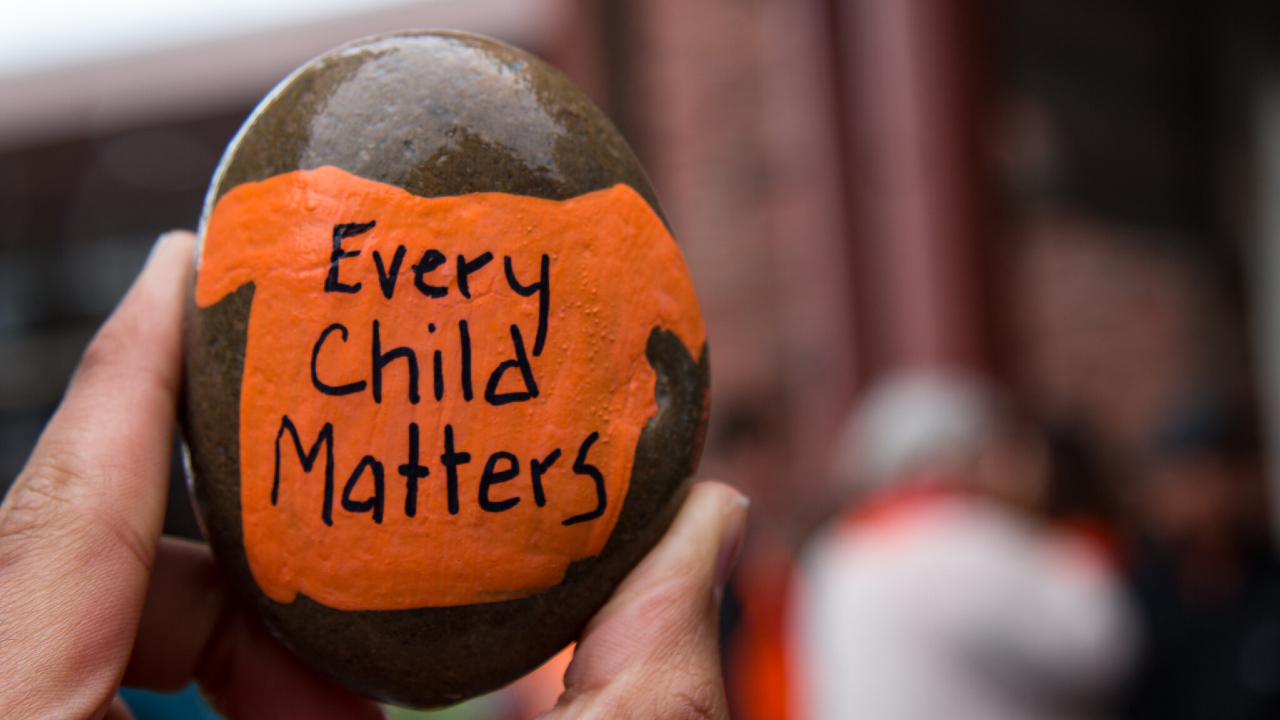Any orange shirt works, of course. But if you hope to truly honour the cause behind Orange Shirt Day, you might want to think a little more carefully.
This Friday, September 30 is our country’s second National Day for Truth and Reconciliation, also known as Orange Shirt Day. It’s meant for people to reflect on the history of residential schools, and the survivors that live on today.
Your child’s school might ask you to dress them in an orange shirt or an actual Orange Shirt Day shirt. And if you’re asking yourself where the right place is to buy one is, you’re not alone. It can be a tough thing to navigate. But if you hope to truly honour the original reasoning behind Orange Shirt Day, there are some questions you should ask yourself before you make the purchase.
If you’re buying the shirt from a for-profit corporation, is the company donating all, some, or none of the profits to appropriate charities? Is the company only talking about Canada’s genocidal past one day out of the year or is it an ongoing, year-round conversation?
You may have considered buying a shirt from one of the hundreds of individuals selling them on personal online shops like Etsy. You’ll certainly find a multitude of designs, phrases and pricing, and indeed, this can be a beautiful means of support for the hundreds of thousands of Indigenous families who have been affected by the long-term impacts of residential schools. But even buying direct can be fraught, because while some people are giving all or some of the proceeds to proper charitable organizations that support Indigenous people and Residential School Survivors, there are also those who have zero percent of the sales being returned back to the community the T-shirts were originally made for.
When supporting any charitable cause, you need to exercise caution, and with Orange Shirt Day T-shirts, it’s no different.
Take Walmart, for example. This year, the big box retailer is selling shirts with an Indigenous-made design by Timothy Foster, a Gitxsan artist from the house of Niisto in the Lax Seel clan. All proceeds are going directly to the Orange Shirt Society, a charity that focuses on raising awareness about the lasting effects of residential school survivors. But while retailers like Walmart have the intention to support the cause ethically, we must be mindful of the experiences that many Indigenous peoples undergo while doing their daily shopping there across colonially named Canada.
I’m Anishinaabe, and it’s common for me to hear stories of Indigenous friends and relatives who say they were followed or harassed in Walmart stores, often being suspected and accused of shoplifting. Indigenous shoppers at Wal-Mart locations across our traditional territories have often had experiences of being followed in stores by sales associates and being asked if they are going to pay for an item while they take their time at self-check-outs. This is a constant issue. I’m not saying don’t buy the shirt at Walmart, especially if you’re shopping last-minute and have run out of time to look elsewhere. But please continue to think about the racism and discrimination that Indigenous folks undergo and experience within that corporation.
The challenge at this time of year is for individuals, parents and teachers to do their best to support the cause in a way that is ethical while balancing the cost associated with purchasing the shirts. Many families simply cannot afford a $35 T-shirt that their child will quickly outgrow.
That said, does supporting the cause mean buying a brand new orange shirt every year? Not necessarily. Maybe not even ideally.
Supporting the cause could look like donating to appropriate charitable organizations that support Residential School Survivors and help Indigenous families throughout the whole year. It could look like teaching your children about the history of residential schools at developmentally appropriate levels. It could look like advocating against racism when one sees it happening right before their eyes in public spaces, rather than being bystanders and observing. It could look like doing more than wearing an orange T-shirt on Orange Shirt Day. The options really are endless on how to support the cause, and many don’t require money at all (or buying a T-shirt the night before September 30 at a multinational retailer).
If you’re looking for an example of a great place from which to buy orange shirts, check out Legacy of Hope Foundation itself. All of the proceeds go directly to Indigenous survivors, communities, researchers and educators to develop resources to increase public awareness and education on the history and dark legacy of residential schools.
The whole thing really comes down to being mindful and intentional about how you’re supporting the movement, and reflecting on the question: “Even after I’ve purchased a T-shirt, how can I support the movement year-round?”
The end goal is to truly have the support for our survivors, our families, and our healing, 365 days a year.
Because that is true allyship.

 PARENTING TIPS
PARENTING TIPS PREGNANCY
PREGNANCY BABY CARE
BABY CARE TODDLERS
TODDLERS TEENS
TEENS HEALTH CARE
HEALTH CARE ACTIVITIES & CRAFTS
ACTIVITIES & CRAFTS


